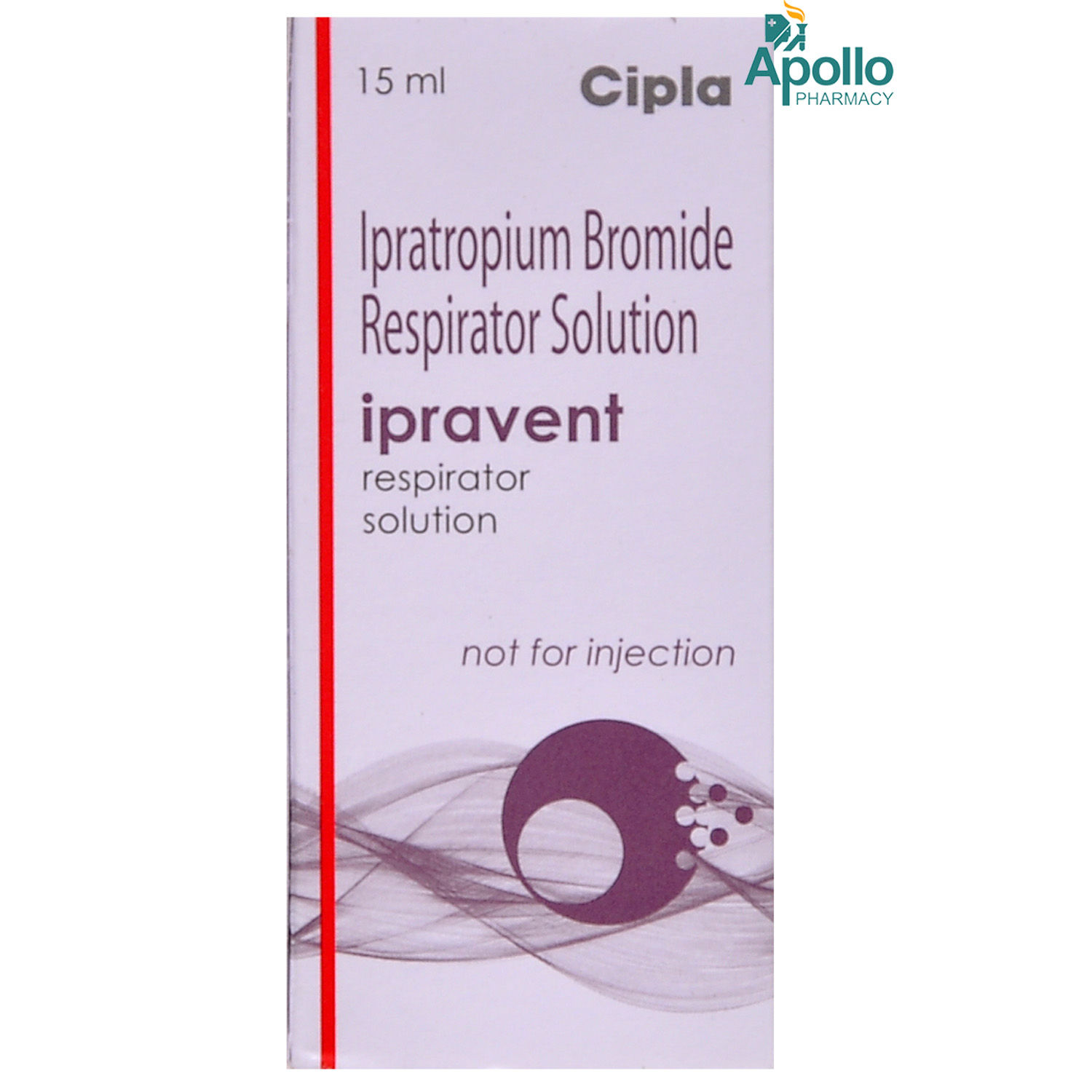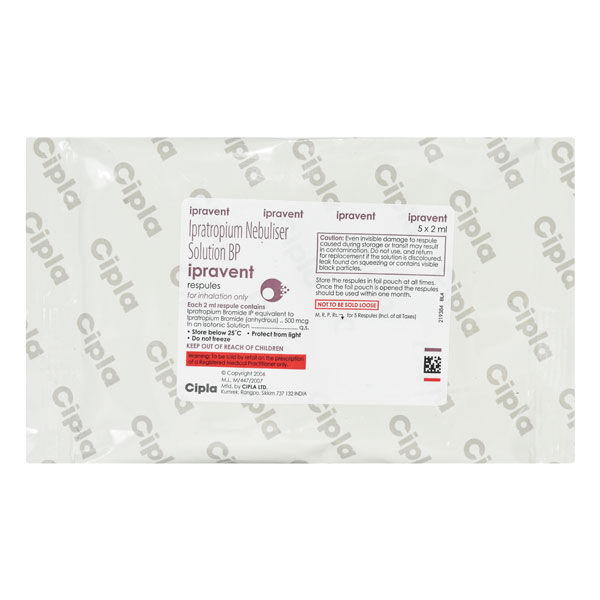Ipratropium Bromide
About Ipratropium Bromide
Ipratropium Bromide is used to treat asthma and chronic obstructive pulmonary disease (COPD). Asthma is a condition in which airways narrow and swell, resulting in difficulty breathing, coughing, and wheezing (a whistling sound). COPD is a chronic (long-term) condition caused by a group of lung diseases, such as emphysema (a condition in which the air sacs of the lungs are damaged) and chronic bronchitis (inflammation of tubes (bronchi) that carry air to and from the lungs).
Ipratropium Bromide contains ‘Ipratropium bromide’, which is an anticholinergic. It is used to treat symptoms associated with chronic lung conditions and reduce the risk of frequent asthma attacks. It acts as a bronchodilator and works by dilating the muscles in the airway. It also reduces mucus (phlegm) production. This effect helps to improve lung function and reduce breathing difficulty. It is a short-acting drug.
Use this medicine as prescribed by your doctor. The common side-effects of Ipratropium Bromide are headache, dizziness, epistaxis (nosebleed), nausea, nasal dryness, nasal irritation, stomach upset, and cough, and throat irritation after inhalation. Most of these side effects resolve themselves without requiring medical attention. However, if the side effects persist or worsen, seek medical help immediately.
Do not take Ipratropium Bromide if you are allergic to ‘ipratropium bromide’ or any other ingredients present in it. Before taking Ipratropium Bromide, inform your doctor if you have a history of glaucoma (an eye condition), urinary retention and an enlarged prostate gland. Inform your doctor if you are using any prescription, non-prescription or nutritional supplements; also, inform your doctor if you are pregnant, planning to become pregnant, or breastfeeding.
Uses of Ipratropium Bromide
• Asthma Management: Ipratropium Bromide helps to manage asthma by opening airways and relieving symptoms like wheezing and shortness of breath.
• Chronic Obstructive Pulmonary Disease (COPD): Ipratropium Bromide is used to treat COPD symptoms by improving lung function and relieving chronic cough and breathing difficulties.
• Prevention of Exercise-Induced Bronchospasm: Ipratropium Bromide helps to prevent exercise-induced bronchospasm, enabling easier breathing during physical activity.
• Emergency Asthma Relief: In an acute situation, Ipratropium Bromide provides quick relief by helping patients breathe easier and regain control.
• Reduce Mucus Clearance: Ipratropium Bromide helps to thin mucus, making it easier to clear from airways, which improves breathing and respiratory function.
Medicinal Benefits
Ipratropium Bromide contains ‘ipratropium bromide’, which is an ‘anticholinergic’ drug. It is a widely used bronchodilator. It can effectively reduce symptoms of asthma, chronic obstructive pulmonary disease(COPD) and other lung conditions. It can also decrease the risk of recurrent asthma episodes. It helps to improve lung function. It relaxes the muscles along the airway passage, easing the breathing difficulty. It reduces phlegm production, improving cough symptoms. Besides, it has a quick onset of action.
Directions for Use
- Follow your doctor's instructions on the dosage and timing of this medication.
- Hold the inhaler with the mouthpiece facing downwards. Form a tight seal by placing your lips around the mouthpiece. Start breathing slowly with your mouth and push down the inhaler once. Remove the inhaler and breathe normally.
- Ipratropium Bromide is for inhalation purpose only.
Storage
Side Effects of Ipratropium Bromide
- Breathlessness
- Headache, dizziness
- Nausea, stomach upset
- Epistaxis (nosebleed), nasal dryness, nasal irritation and cough
- Throat irritation after inhalation
Drug Warnings
Do not take Ipratropium Bromide if you are allergic to ‘ipratropium bromide’ or any ingredients present in it. This medicine should be used with caution in patients with glaucoma (increased inside pressure of the eye) and urinary retention. The inhalation should be used carefully. Ensure the medicine does not reach the eye as it may result in eye problems such as mydriasis (dilation of the pupil), increased pressure inside the eye, and angle-closure glaucoma (a condition caused by blocked drainage canals in the eye), eye pain, and visual halos. If you develop paradoxical bronchospasm (sudden narrowing of bronchi muscles leading to obstructed breathing), you should discontinue treatment immediately and consult a doctor. This medicine should be used with caution in pregnant and breastfeeding women.
Drug Interactions
Drug-drug interactions: Ipratropium Bromide may interact with other anticholinergics used to treat COPD (tiotropium), irritable bowel syndrome (mebeverine), urinary incontinence (oxybutynin and solifenacin), or cough (e.g. dextromethorphan). It may also interact with other drugs that treat lung diseases (salbutamol, theophylline, and aminophylline).
Drug-food interactions: No interactions found.
Drug-disease interactions: Ipratropium Bromide should be used with caution in patients with glaucoma, enlarged prostate gland, cystic fibrosis (an inherited disorder that damages lungs and gut), and urinary retention (difficulty passing urine).
Drug-Drug Interactions Checker List:
Safety Advice

Alcohol
unsafeAlcohol may worsen the condition, so do not take alcohol while using Ipratropium Bromide.

Pregnancy
consult your doctorIpratropium Bromide is a Category B medicine and may not harm the unborn babies. It should be used in pregnant women if clinically needed.

Breast Feeding
cautionIpratropium Bromide should be used with caution in breastfeeding mothers.

Driving
unsafeIpratropium Bromide may cause dizziness and affect your ability to drive. So, do not drive or operate heavy machinery after using Ipratropium Bromide.

Liver
cautionIpratropium Bromide should be used with caution in patients with liver diseases.

Kidney
cautionIpratropium Bromide should be used with caution in patients with kidney diseases. Dose adjustments may be necessary.

Children
cautionIpratropium Bromide can be used in children if clinically needed.
Habit Forming
Diet & Lifestyle Advise
- Know your triggers like allergens, such as pollen, dust, and food items that make your asthma severe.
- Quit smoking and avoid passive smoking. Smoking also reduces the effectiveness of the medicine.
- Eat a healthy diet and exercise regularly to strengthen your breathing muscles and boost your immune system.
- Learning breathing exercises will help you move more air in and out of your lungs.
Special Advise
- If you are taking albuterol and ipratropium in your eyes, there can be a chance that he/she may develop narrow-angle glaucoma. So, if you have narrow-angle glaucoma, your condition may worsen.
- Take the first dose under medical supervision as it may cause wheezing or tightening of the airways (bronchospasm) immediately after use.
- Monitor your blood potassium level regularly while taking this medication.
Patients Concern
Disease/Condition Glossary
Asthma: It is a chronic (long-term) condition in which the airways become swollen and narrowed due to inflammation. It also results in increased production of mucus (thick fluid secreted by respiratory tissues) in the airways. Symptoms include breathing difficulty, coughing, and wheezing (a whistling sound).
Chronic obstructive pulmonary disease (COPD): This is chronic inflammation that occurs due to a group of conditions, such as emphysema, chronic bronchitis, and refractory or recurrent asthma. Emphysema is a condition in which alveoli (air sacs) are damaged, leading to shortness of breath. Chronic bronchitis is a condition in which the bronchus (passage of the airway that conducts air) becomes inflamed, leading to increased sputum production.
FAQs
Ipratropium Bromide is used to treat asthma and chronic obstructive pulmonary disease (COPD).
Ipratropium Bromide is a bronchodilator. It is used to treat symptoms of chronic lung conditions such as asthma and chronic obstructive pulmonary disorder (COPD). It relaxes the muscles present in the airway and decreases mucus production, thus reducing breathing difficulty.
Ipratropium Bromide is a short-acting drug. It has an onset of 15-30 minutes, and its effects last for about 3-5 hours.
Ipratropium Bromide is well-tolerated and can be used as maintenance therapy for a longer period. It can effectively regulate the symptoms and improve quality of life (QOL).
Ipratropium Bromide may cause an increase in heart rate (tachycardia). However, this effect is observed mostly when Ipratropium Bromide is taken in high doses. So, it is advised not to increase or decrease the dose without your doctor's advice.
Ipratropium Bromide can be used in children above 6 years with dose adjustments. However, the medicine should be taken only under an adult's supervision.
The common side effects of Ipratropium Bromide are headache, dizziness, epistaxis (nosebleed), nausea, nasal dryness, nasal irritation, stomach upset, cough, and throat irritation after inhalation. These effects usually go away without medical attention.
No, Ipratropium Bromide is a short-acting bronchodilator which lasts for 3-5 hours.
No, Ipratropium Bromide is not a steroid. It is a bronchodilator used to treat asthma and chronic obstructive pulmonary disease (COPD).
Ipratropium Bromide is not a narcotic. It does not contain opium or its derivatives.
No, Ipratropium Bromide does not cause weight gain. If you notice any weight changes manage it with regular exercises, diet and lifestyle.
Ipratropium Bromide can cause constipation as a common side effect. Eat fibre-rich foods, drink more water, and exercise regularly to maintain healthy bowel movement.
Ipratropium Bromide is not the same as albuterol but they belong to the same group of medications called bronchodilators. Ipratropium Bromide is an anticholinergic medicine that works by preventing acetylcholine from closing the airways whereas albuterol is a beta-agonist medication that works by relaxing the muscles in the lungs to open up the airways.
Ipratropium Bromide is not the same as budesonide. Ipratropium Bromide is a bronchodilator used for the treatment of chronic obstructive pulmonary disease (COPD) and asthma whereas budesonide is a glucocorticoid that is used in the treatment of asthma and bronchitis. It can also be used to prevent bronchospasms in people with asthma.
Ipratropium Bromide is not an antihistaminic/antibiotic. It belongs to the group of medications called anticholinergic bronchodilators.
Ipratropium Bromide can be administered either alone or with other bronchodilators, especially beta-adrenergics, for maintenance treatment of bronchospasm associated with chronic obstructive pulmonary disease.
Ipratropium Bromide does not cause increase in blood pressure if taken alone but it may raise the risk of high blood pressure when taken with albuterol. Inform the doctor if you have high blood pressure before starting Ipratropium Bromide.
Yes, Ipratropium Bromide is a short acting-cholinergic also known as a short-acting muscarinic antagonist (SAMA).







